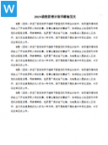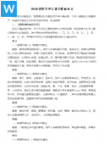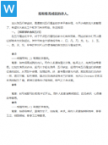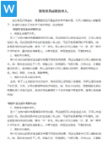








一般将来时的标志词
在英语中,一般将来时主要通过以下几种方式表示:1. **使用动词原形+will** 或 **will be**: - *I will go to the park.* (我将会去公园。) - *She will be studying tomorrow.* (她将会在明天学习。)2. **使用be going to** 结构: - *I am going to finish this book by the end of this week.* (我将在本周末完成这本书。) - *We are going to have a meeting next Monday.* (我们将在下周一开会。)3. **使用be about to** 结构(表示即将发生的动作): - *He is about to leave for the airport.* (他即将去机场。) - *They are about to start the match.* (他们即将开始比赛。)4. **使用some time/this time next year** 等表达特定时间之后: - *Next year, I'll visit my grandparents.* (明年我将拜访我的祖父母。) - *This time next year, I'll be living in a new city.* (一年后,我将会住在新的城市。)5. **使用next year/month/week/day** 等表达未来的时间: - *Next week, we'll have a holiday.* (下个星期,我们将会有假期。) - *In a year, I'll be 18 years old.* (过一年,我将会18岁。)6. **使用once** 或 **when** 等引导从句表达条件和结果: - *Once we arrive, we'll have dinner.* (一旦我们到达,我们将吃晚饭。) - *When it rains, I stay at home.* (下雨时,我待在家里。)通过上述表达方式,我们可以准确地在英语中表达一般将来时态。每种方式都有其特定的语境和使用场景,选择哪种方式取决于句子的整体语境和意图。
下面详细列出并举例上述每一种表示一般将来时的方法:1. **使用动词原形+will** 或 **will be**: - **用法**:直接在动词前加上“will”,或者在“be”动词后加上“will”,用来表示即将发生的动作或状态。 - **例子**:I will go to the park.(我将会去公园。) She will be studying tomorrow.(她将会在明天学习。)2. **使用be going to** 结构: - **用法**:通常用于计划、安排或即将发生的事情。 - **例子**:I am going to finish this book by the end of this week.(我将在本周末完成这本书。) We are going to have a meeting next Monday.(我们将在下周一开会。)3. **使用be about to** 结构(表示即将发生的动作): - **用法**:直接使用“be about to”后面接动词原形表示即将发生的事情。 - **例子**:He is about to leave for the airport.(他即将去机场。) They are about to start the match.(他们即将开始比赛。)4. **使用some time/this time next year** 等表达特定时间之后: - **用法**:使用表示将来时间的词组或短语来描述事件在未来特定时间发生的情况。 - **例子**:Next year, I'll visit my grandparents.(明年我将拜访我的祖父母。) This time next year, I'll be living in a new city.(一年后,我将会住在新的城市。)5. **使用next year/month/week/day** 等表达未来的时间: - **用法**:直接使用这些表示时间的词来描述未来的事件。 - **例子**:Next week, we'll have a holiday.(下个星期,我们将会有假期。) In a year, I'll be 18 years old.(过一年,我将会18岁。)6. **使用once** 或 **when** 等引导从句表达条件和结果: - **用法**:使用这些词引导条件从句,表示当某种条件满足时将发生的结果。 - **例子**:Once we arrive, we'll have dinner.(一旦我们到达,我们将吃晚饭。) When it rains, I stay at home.(下雨时,我待在家里。)这些表达方式分别适用于不同的语境,选择使用哪种方式取决于句子的具体内容和说话者想要表达的清晰度与精确性。
最新句子素材
句子素材排行
- 1 关于环保的美文美段
- 2 充满阳光的句子简短
- 3 保护环境的简短句
- 4 佛经经典名句关于放下
- 5 2020奋斗励志句子
- 6 人生精辟的正能量句子
- 7 特别吸引人的交友宣言
- 8 关于读书的名言警句句子
- 9 中国名人名言100句
- 10 斯大林名言



